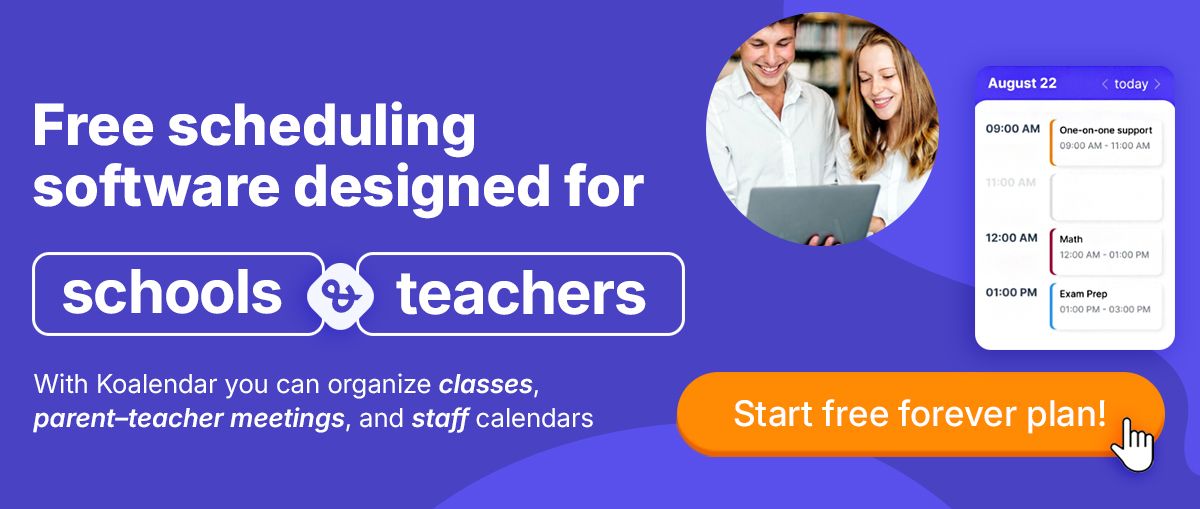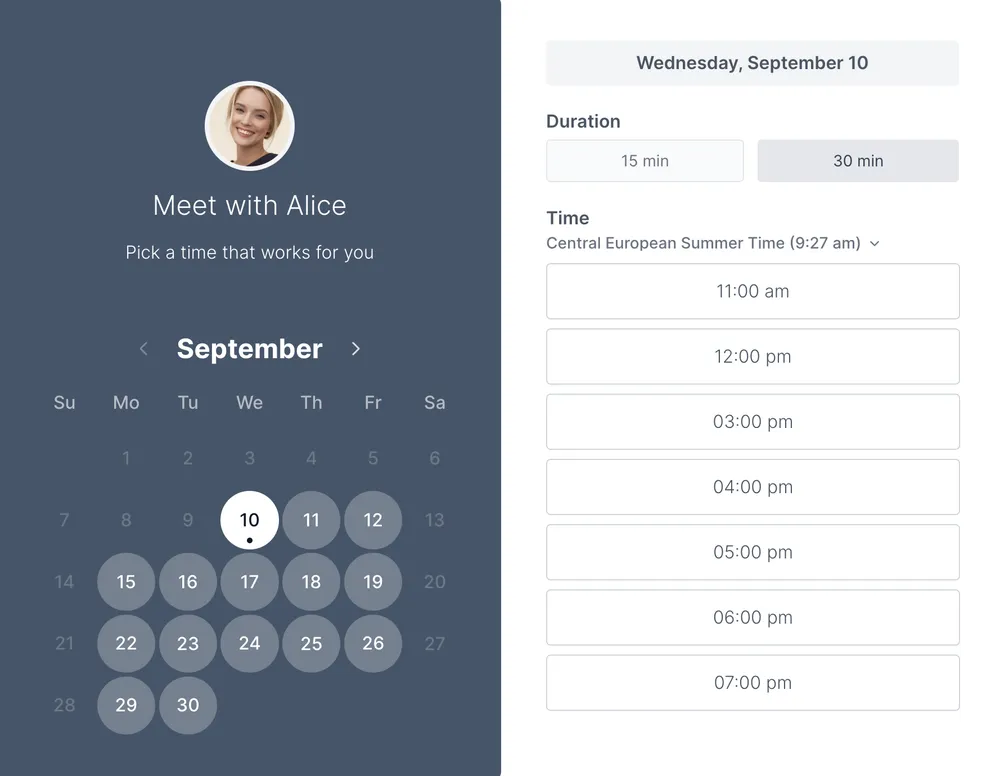If you’re a teacher, nights and weekends often become your “planning hours.” Grading, email follow-ups, and lesson prep pile up. In the 2024-25 school year, a survey by Gallup and the Walton Family Foundation found that 60% of K-12 teachers used an AI tool at work. Among those who used AI weekly, they gained nearly six extra hours per week, which is equivalent to six full weeks over the school year.
But technology doesn’t wait. Just when you adapt to one tool, another updates. The pace of AI development is so rapid that it can feel like the tools are changing under your feet, making it hard to know which ones are stable, trustworthy, or really free.
In this guide, our editorial team has stepped into the teacher’s role and set out to find the most effective free AI tools for educators, covering every stage of the teaching journey: from lesson planning and presentation creation tools, to scheduling and grading.
We selected tools based on their purpose, strengths, and limitations, offering a transparent view of what each tool does well and where it falls short. Our goal: to save you hours of trial and error, avoid overwhelm, and help you skip the chase for never-ending updates.
Think of this guide as a mix-and-match toolbox. You can pick the tools that fit your workflow, and at the end of the article, we share a recommended optimal AI toolkit to help you get started quickly and confidently. Let’s get started.
Comparison chart: free AI software for teachers
 |  | EdPuzzle AI | Magic School AI |  |  | Gradescope AI | ClassDojo AI |  | |  |  | |
| Best for | Scheduling & Communication | Lesson Planning | Virtual Classroom | Lesson Planning & Teaching Tools | Adaptive Learning & Flashcards | AI Teaching Assistant | Assessment & Grading | Parent Communication & Engagement | Video Creation | Lesson Planning | Visual Content | Presentation Creation |
| Limitations | Doesn’t include built-in AI features, but it connects seamlessly with external AI tools | Can generate factual errors; privacy risks when handling sensitive student data | Free plan capped at 20 video activities; limited question formats | Free tier limited by monthly AI “prompt” allowance; interface can feel complex | May require manual editing for accuracy; not ideal for full assessments | Gamification may not suit all age groups | Requires manual review for nuanced answers; LMS integration setup can be tricky | AI behavior reports may oversimplify context; limited customization | Free plan restricts video length and export quality | Templates can feel generic; curriculum alignment not always precise | Some AI features gated behind paid plan; may require design tweaks | Free plan limited in customization; slide designs may need editing |
| Unique benefit | Saves time on admin & improves parent–teacher communication | Real-time AI teaching assistant for classroom planning | Automatically creates interactive video quizzes | Streamlines lesson creation while building AI literacy | Converts lessons, PDFs, and videos into adaptive flashcards | Personalized gamified learning experiences | Reduces grading time and ensures consistent feedback | Real-time insights for parents on student behavior | Turns lesson notes into engaging multimedia content | Rapid lesson plan creation aligned to standards | Creates professional visuals quickly for classroom use | Automatically generates structured, engaging slide decks |
Launched in 2025, Google Gemini is among the most exciting AI technologies for K-12 teachers. It streamlines lesson planning, content creation, differentiation, and administrative tasks while maintaining strong privacy and security standards.
Best for: Lesson planning and administrative support.
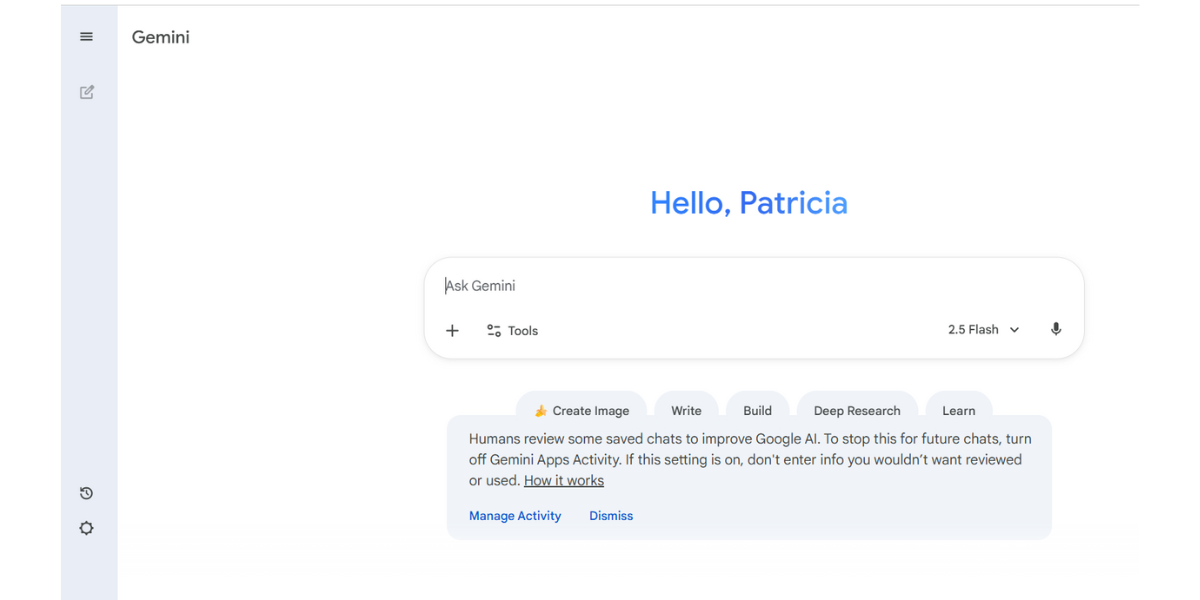
Key features
- AI lesson plan generator
- Real-time student Q&A in Google Classroom
- Seamless integration with other Google tools (Docs, Slides, Forms)
- FERPA and COPPA compatible controls designed with student safety in mind
Benefits
- Helps you generate lesson materials faster
- Provides options for differentiated instruction for more precise planning
- Enables more interactive classrooms through AI-powered student Q&A in Google Classroom
- Supports compliance with U.S. student data privacy regulations (FERPA, COPPA)
Limitations
- Factual inaccuracies: Gemini and similar tools, such as ChatGPT, tend to present made-up information as fact confidently. In our experience preparing lesson materials, historical dates, or scientific explanations might be wrong so you need to make sure to double-check all information carefully to avoid passing wrong information on to students.
- Privacy risks: The way Gemini handles sensitive information isn’t always transparent. We recommend you double check data protection if you’re discussing student grades, behavior notes, or confidential school matters, as there’s a risk that this data may not be fully protected.
Pricing
Free to use model with the Advanced model starting from $19.99/month.
While Koalendar isn’t necessarily an AI tool, it’s still a fantastic option for helping teachers manage their admin tasks and communicate more effectively. Koalendar is a scheduling platform that helps teachers, tutors, and school administrators streamline appointments, parent-teacher conferences, and online lessons.
Best for: Scheduling and communication.
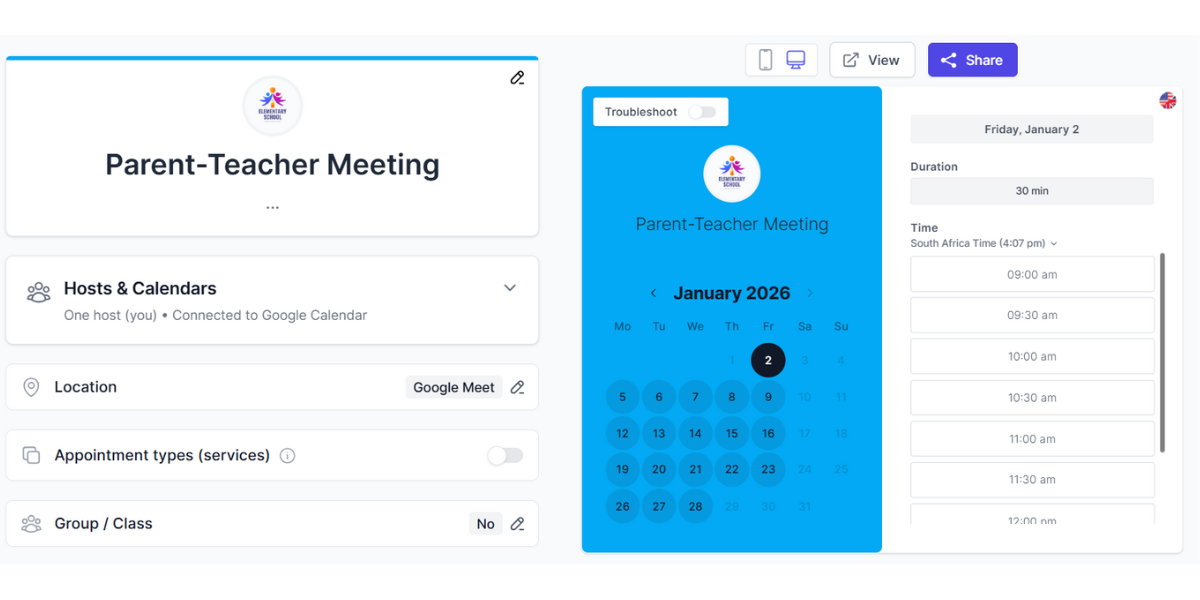
Key features
- Unlimited appointments for classes, parent meetings, or tutoring
- Unlimited scheduling pages for different purposes or event types (parent-teacher meetings, tutoring...)
- Calendar integrations with Google, Outlook, and iCloud to prevent double bookings
- Google Meet integration for online lessons and virtual parent meetings
- Automatic time zone detection for international or remote programs
- Email notifications and confirmations are included at no cost
- Multilingual support, including English, Spanish, and French
- Freemium model, which means you have a free tier available forever
Benefits
- Saves time by automating appointment scheduling, reducing email and phone coordination. Improves communication with clear scheduling links and instant confirmations for parents.
- Supports virtual learning with integrated Google Meet.
- Flexible and scalable, supporting recurring classes, tutoring sessions, and multiple booking pages.
- Accessible globally with time zone detection and multilingual support.
- Risk-free for teachers with a robust free tier and no credit card required.
Limitations
- Limited functionality: While Koalendar is simple and easy to set up, the tool isn't an education tool per se (it serves many other professionals too). It's a generalist tool to simplify scheduling.
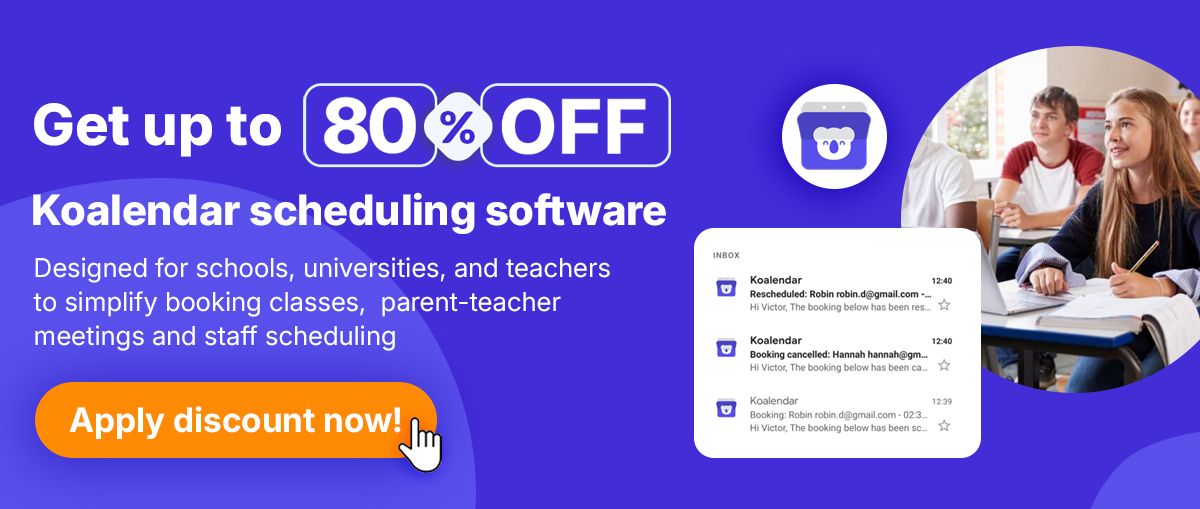
Pricing
Koalendar’s Free Forever plan gives you unlimited bookings, multiple scheduling pages, calendar sync, and Google Meet integration (at no cost). If you need extras like reminder emails or advanced customization, you can upgrade anytime for just $6.99/month.
In 2025, Edpuzzle introduced AI features to make video-based learning even more interactive. You can use this tool to take any YouTube video, recorded lesson, or uploaded clip and AI will automatically generate comprehension questions and projects, saving you significant prep time while boosting student engagement.
Best for: Interactive learning and activities.
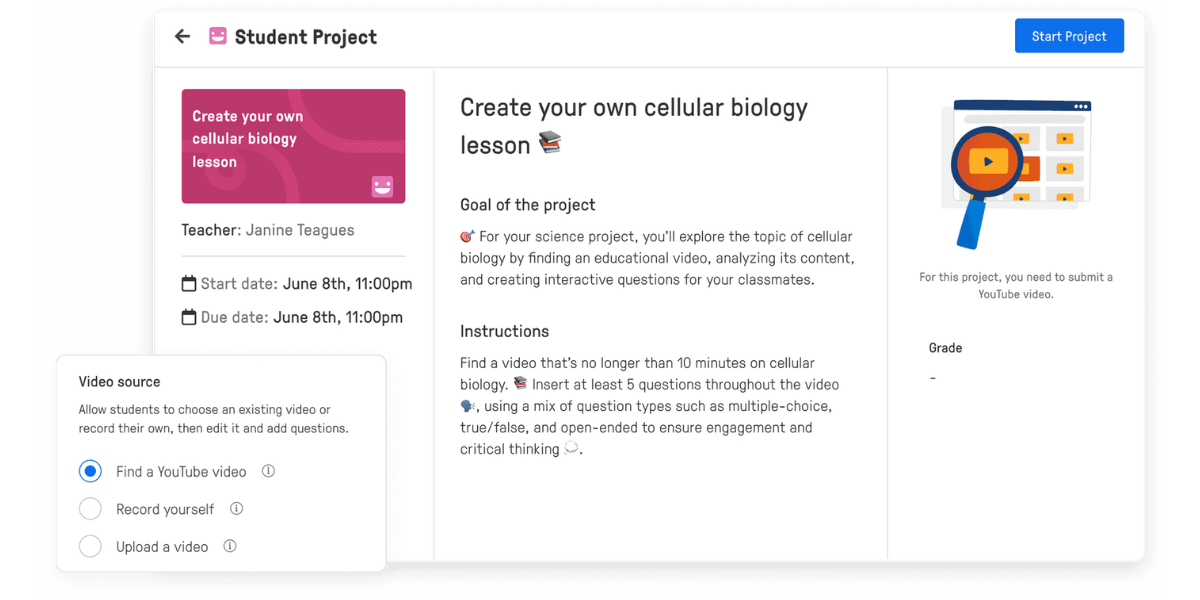
Key features
- AI-generated quizzes and projects from any video
- Question features to check understanding
- Detailed student analytics and progress tracking
Benefits
- Save time by auto-generating interactive quizzes
- Increases student engagement through embedded questions and gamification tools
- Provides detailed analytics so teachers can quickly identify who is struggling
- Works seamlessly with popular LMS platforms, making adoption simple
- Supports formative assessment by turning passive video viewing into active learning
Limitations
- Content capping: The free version lets you save up to only 20 video activities; deleting old ones won’t free up space unless you upgrade or refer colleagues.
- Limited question types: EdPuzzle offers a range of video and content tools, but is limited for teachers looking for specific or more personalised functionalities that expand beyond the given templates.
Pricing
Free to use model with Pro Teacher model starting from $13.75/month.
Magic School AI is a teacher-focused platform built on generative AI. It provides over 50 “magic tools” designed specifically for educators, making it easy to create assessments, lesson materials, and feedback while keeping privacy and classroom safety in mind. Its goal is to save teachers' time while helping them integrate AI into daily practice responsibly.
Best for: Teaching tools and lesson planning.
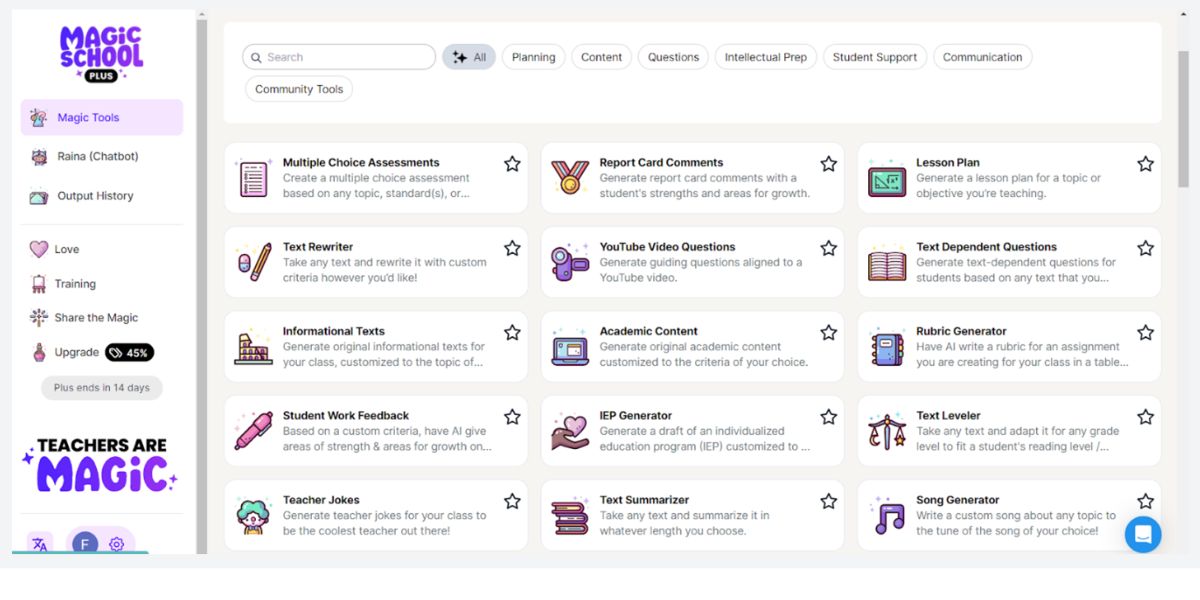
Key features
- Multiple-choice quiz and test generator
- Assessment tools aligned with Universal Design for Learning (UDL) principles
- AI-powered student feedback generator
- Library of pre-written educator-specific AI prompts
- FERPA- and COPPA-conscious design to protect student data
Benefits
- Saves time on creating quizzes, tests, and assessments
- Supports inclusive education with UDL-based assessment templates
- Provides quick, structured student feedback, reducing grading workload
- Designed with a focus on safety and privacy, ensuring compliance in K–12 settings
Limitations
- Usage caps: While Magic School offers a free tier, it's limited by monthly AI “prompt” allowances. If you want to use it daily for lesson planning or parent communication, you may run out mid-month unless you upgrade.
- Complicated interface: While Magic School AI has dozens of useful tools available to teachers, we found the platform hard to navigate at times because of the sheer amount of content. Finding the right feature quickly can be difficult when learning to use the tool for the first time.
Pricing
Free to use model with Plus model starting from $99.96/year. Custom platform plans are also available with POA.
AnkiDecks AI allows educators to quickly turn lessons, PDFs, YouTube videos, or other content into adaptive flashcards and quizzes. Its AI engine can auto-generate cards that adjust to student performance, helping reinforce learning efficiently and consistently.
Best for: Flashcard creation.
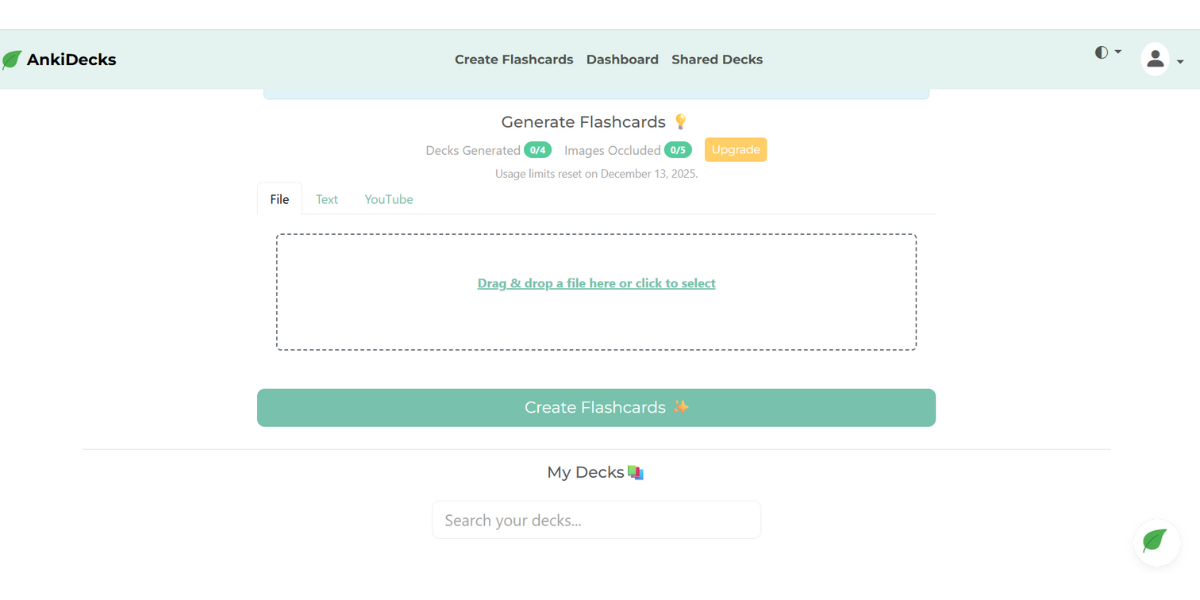
Key features
- Flashcard and quiz generation from multiple content sources (text, PDFs, videos)
- Adaptive learning algorithms that adjust to student progress
- Translation capabilities in 50+ languages
- Automatic image generation to enhance retention
Benefits
- Saves teachers' time by automating flashcard and quiz creation from diverse resources
- Supports multilingual classrooms with built-in translation tools. Enhances engagement and memory retention with AI-generated images
- Provides adaptive learning paths, allowing students to practice what they need most. Easily integrates with lessons or study materials, helping teachers deliver more interactive content
Limitations
- Manual editing: Flashcards may require teacher review to ensure accuracy
- Storage limits: The Free plan restricts the number of decks you can save per month
Pricing
- Free plan available; paid tiers start from around $6/month depending on storage and features
- Storage limits: The Free plan restricts the number of decks you can upload per month
Wayground, launched in 2025, combines AI with gamification to create personalized learning experiences. Teachers can generate lesson plans, assessments, and multimedia content while engaging students through challenges and rewards. Early adopters in middle school classrooms report higher engagement and participation.
Best for: AI teaching assistant and planning.
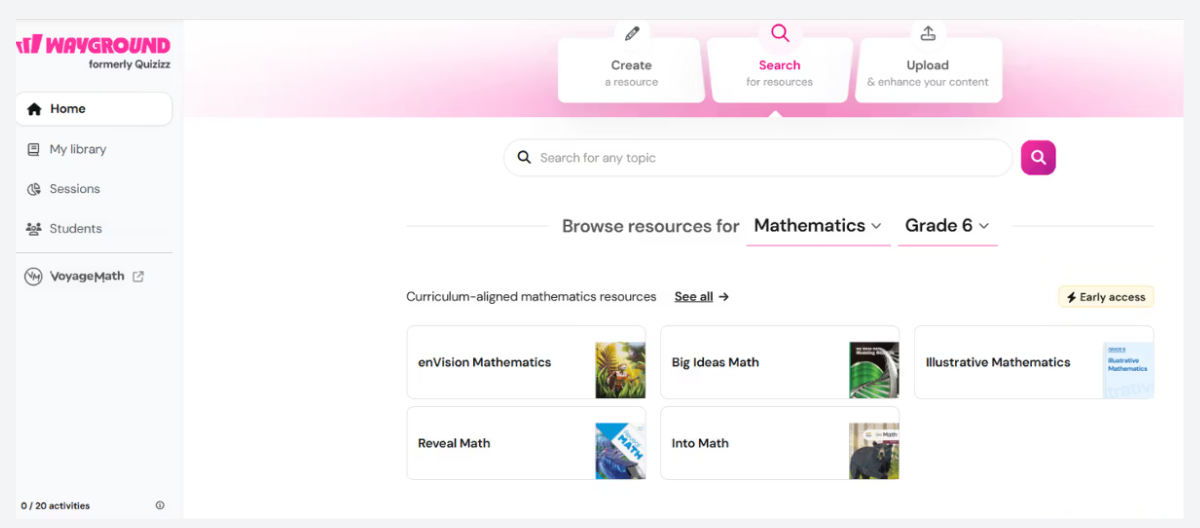
Key features
- AI-generated lesson plans, assessments, videos, and flashcards
- A gamified rewards system to motivate student learning
- Student feedback and customization tools for differentiated instruction
- Integration with Google Classroom and other popular EdTech platforms
Benefits
- Provides personalized learning paths for each student using AI insights
- Encourages active engagement through gamified classroom challenges
- Helps teachers save time with automated lesson and assessment creation
- Supports differentiated instruction with customizable student feedback
- Seamlessly integrates with existing classroom tools for smooth adoption
Limitations
- Early adoption: Some features still feel experimental in classrooms
- Feature lock: Advanced analytics and customization require a paid plan
Pricing
Free basic plan; premium plans start from $12/month with full classroom integrations and advanced gamification.
Gradescope AI uses artificial intelligence to assist you in grading assignments, quizzes, and exams faster and more consistently. It works across multiple formats including handwritten, digital, or code-based submissions, reducing manual workload while maintaining grading accuracy.
Best for: Grading and assessments.

Key features
- AI-assisted grading for handwritten and digital submissions
- Automatic rubric application for consistent scoring
- Analytics dashboards to track student performance and identify trends
- Integration with major LMS platforms like Canvas, Blackboard, and Moodle
Benefits
- Reduces teacher grading workload by automating repetitive scoring tasks
- Ensures consistent and objective grading using AI-applied rubrics
- Provides actionable insights through student performance analytics
- Supports multiple assignment types, including essays, problem sets, and code
- Integrates with existing LMS platforms, making adoption seamless
Limitations
- Oversight required: AI grading struggles with subjective answers like essays
- Setup time: LMS integrations can be complex for first-time users
Pricing
Free plan available for individual teachers; institutional pricing is custom and varies by district or university.
ClassDojo AI helps teachers provide parents with clear, timely insights into students' behavior and participation. AI-generated summaries and real-time notifications support stronger parent-teacher collaboration and encourage positive student engagement.
Best for: Parent communication and student engagement
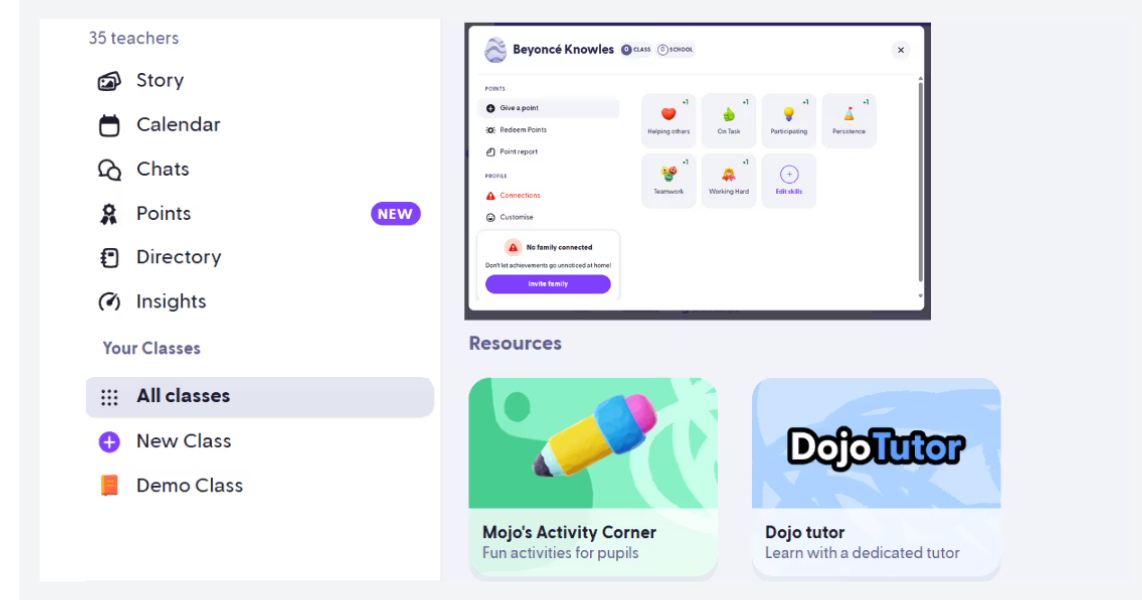
Key features
- AI-generated behavior reports for each student.
- Real-time parent communication app.
- Student motivation and reward tools.
- Integration with classroom management features.
Benefits
- Keeps parents informed with automated behavior summaries, reducing manual reporting
- Improves parent-teacher communication with real-time updates
- Supports student engagement and motivation through reward tracking and recognition
- Reduces administrative workload for teachers while maintaining transparency
- Works within existing ClassDojo classroom management tools for easy adoption
Limitations
- Simplified context: AI behavior summaries may overlook classroom nuances.
- Customization gaps: Limited flexibility in tailoring reports or notifications.
Pricing
Core features are free for teachers and parents. Optional ClassDojo Plus subscription for families starts at $7.99/month.
Pictory AI helps teachers transform scripts, lesson notes, or articles into short educational videos. It automates video creation and summarization, making content more engaging and digestible for students.
Best for: Video creation.
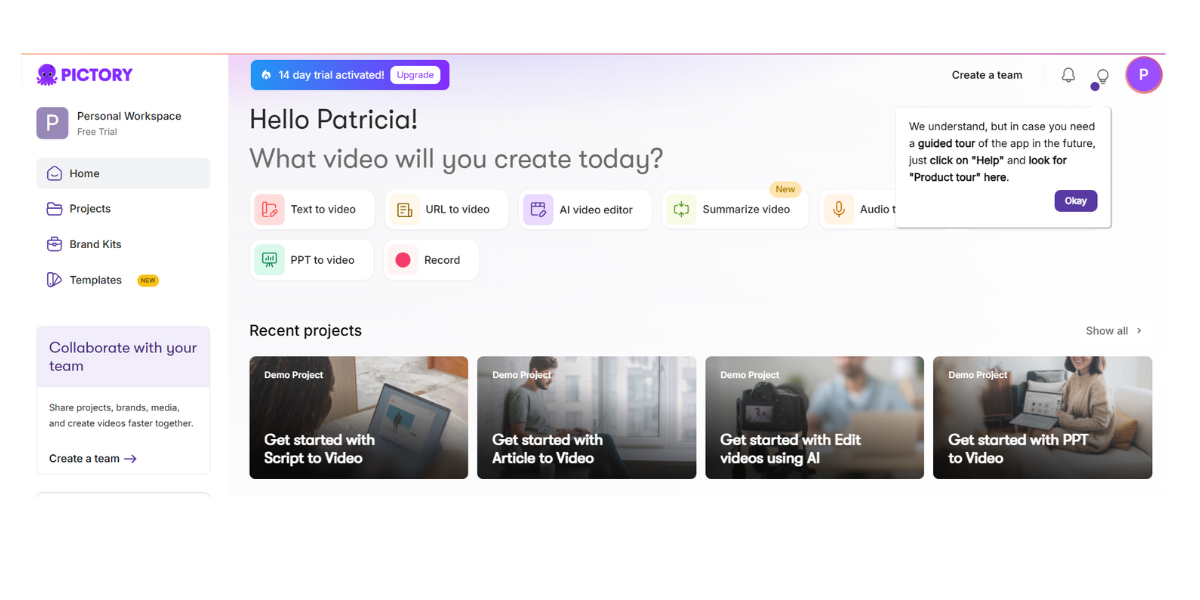
Key features
- Converts text or scripts into video lessons
- AI-based video summarization for key points
- Stock footage and image suggestions
- Captions and subtitles generation
Benefits
- Saves time when creating multimedia content
- Makes lessons more visually engaging and accessibl
- Helps students absorb key concepts quickly
- Reduces manual video editing workload
Limitations
- Video length: The Free plan restricts the duration and quality of exports
- Generic output: Stock footage and captions often need manual refinement
Pricing
Free 14-day trial available; paid plans begin at $19/month for longer videos and higher-quality exports.
Lesson Robot helps teachers cut planning time by generating curriculum-aligned lesson outlines in minutes. Instead of starting from scratch, educators can customize AI-suggested templates to match their classroom needs.
Best for: Lesson planning and resource generation.

Key features
- AI-generated lesson plans
- Topic-specific resource suggestions
- Curriculum alignment tools
- Customizable teaching templates
Benefits
- Speeds up lesson planning and prep work
- Ensures alignment with curriculum standards
- Provides ready-to-use resources for classroom activities
- Helps teachers focus more on instruction rather than planning
Limitations
- Generic templates: Lesson plans may need personalization for classroom use
- Free tier limits: Monthly cap on the number of plans you can generate
Pricing
Free version with limited templates; paid tiers start from $10/month for expanded lesson planning features.
Canva AI provides teachers with intuitive tools to design presentations, worksheets, posters, and other visual resources. Its AI-powered features speed up design and improve classroom engagement.
Best for: Visual content creation.
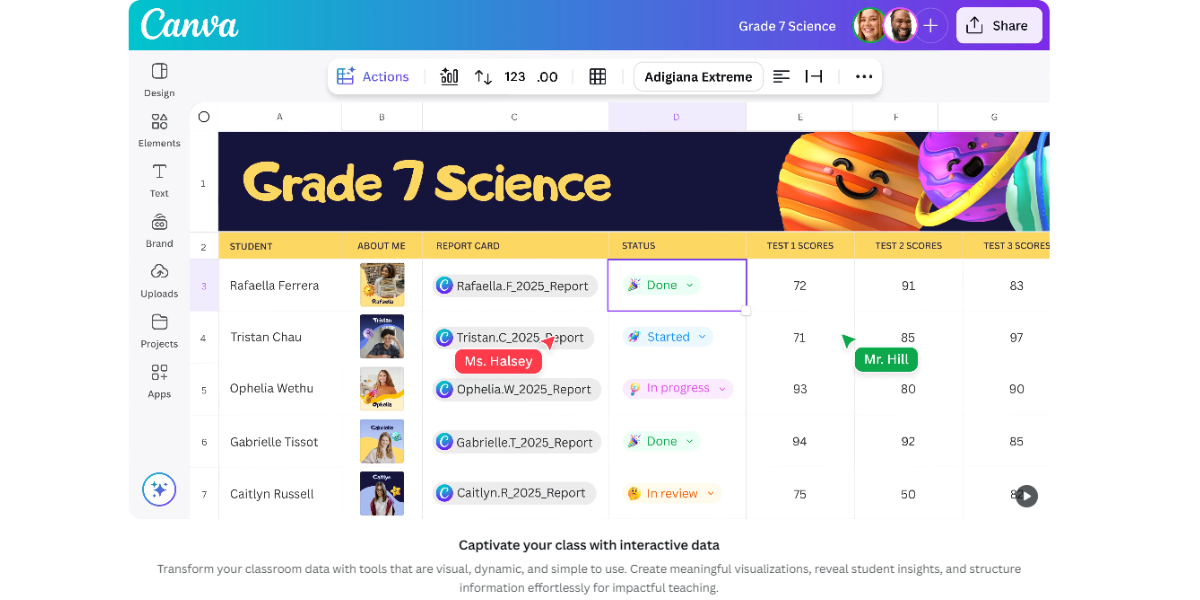
Key features
- AI-assisted design templates
- Automatic image and layout suggestions
- Infographic and presentation creation
- Collaborative editing and sharing
Benefits
- Enables teachers to create professional visuals quickly
- Supports interactive and engaging classroom materials
- Reduces time spent learning design software
- Facilitates collaboration with students or co-teachers
Limitations
- AI restrictions: Many advanced features are locked behind the Pro version
- Design tweaks: Complex layouts often require manual adjustments
Pricing
Free plan with thousands of templates; Canva Pro starts at $12.99/month with full AI-powered features.
With Magic Slides, you can paste your lesson notes and get a polished slide deck in seconds. The AI suggests visuals and layouts, so presentations look clear and engaging without hours of formatting.
Best for: AI-powered presentation creation.
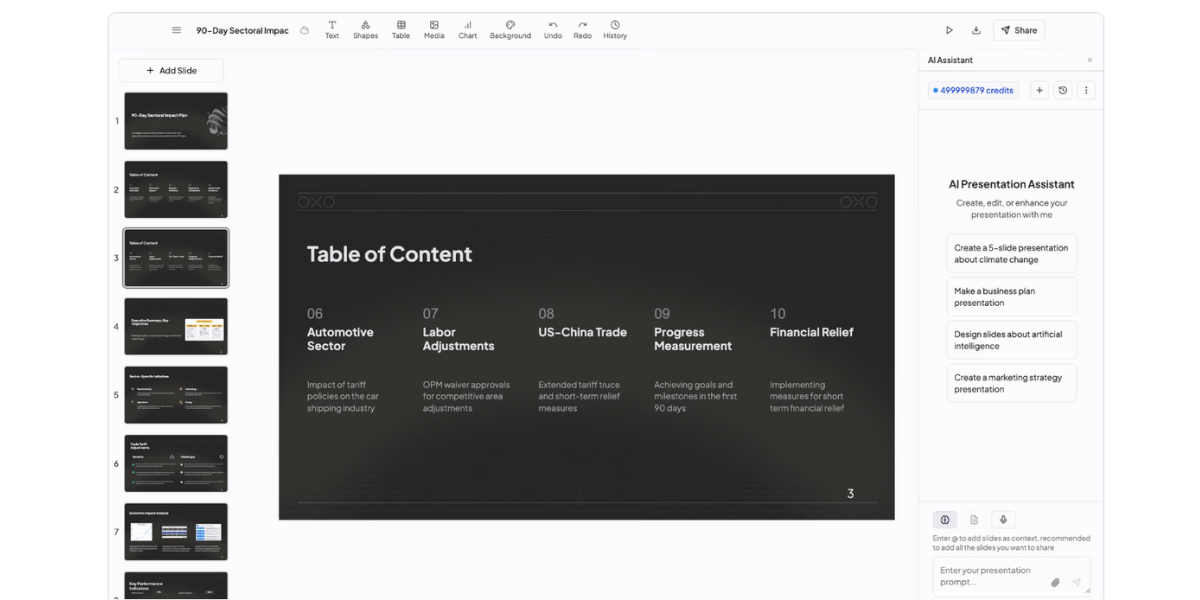
Key features
- Converts text or lesson plans into full presentations
- AI-generated slide designs and visuals
- Customizable slide themes
- Supports export to PowerPoint, PDF, or Google Slides
Benefits
- Reduces time spent building presentations from scratch
- Creates visually engaging slides for students
- Ensures content is well-structured and easy to follow
- Integrates seamlessly with common presentation formats
Limitations
- Editing required: Auto-generated slides may not flow smoothly without tweaks
- Customization: The Free version restricts themes and personalization options
Pricing
Free basic use; paid plans start from $9.99/month for customization and export options.
Things you should consider when choosing a tool
Before signing up for all free AI platforms or digital teaching aids (and end up using none of them) it’s important to pause and evaluate which tools actually align with your classroom needs. Not every “AI tool for teachers” is designed with educators—or students—in mind. Here are the most important factors to consider before adopting any new technology:
1. Privacy and data protection
Always check whether a tool complies with privacy laws such as FERPA and COPPA in the U.S. (or GDPR in Europe). Avoid tools that store or process student data without clear disclosure. Prioritize platforms that let you control what information is collected and shared.
2. Learning curve and accessibility
A powerful tool is useless if it takes hours to learn because you're likely to end up giving up. Look for intuitive interfaces, clear tutorials, and integrations with systems you already use (like Google Classroom, Microsoft Teams, or Zoom). Accessibility is key—students and parents should also be able to navigate it easily.
3. Pedagogical fit
Ask yourself how the tool enhances learning outcomes. Does it foster engagement, critical thinking, or creativity? Or does it simply automate tasks? The best tools support your teaching philosophy rather than distract from it.
4. Cost sustainability
Many platforms start free but quickly move key features behind a paywall. Check what’s included in the free plan and whether upgrades are affordable in the long run.
5. Time-saving potential
The main value of AI tools for teachers is time efficiency. Choose software that actually reduces workload (grading, lesson prep, scheduling) rather than adding another layer of admin work.
6. Integration and compatibility
A tool that integrates with your current workflow—your LMS, calendars, or communication apps—can make adoption seamless. Koalendar, for example, connects easily with Google Calendar, Google Meet, and Outlook, making it ideal for teachers already using those platforms.
Optimal tool kit recommendations
Still not sure what tool(s) to go for? It's no surprise, with hundreds of new AI tools launching every year, it’s easy to get overwhelmed. The following curated toolkit highlights the most effective, reliable, and free (or freemium) platforms you can use in 2026, organized by their strongest classroom function.
| Recommended tool | Why it stands out | |
| Teaching tools & assessments | Magic School AI | Specifically designed for educators, it offers AI-powered quiz creation, lesson planning, and feedback tools that follow privacy-conscious design (FERPA and COPPA aware) |
| Interactive learning | EdPuzzle AI | Turns any video into an interactive quiz or activity, boosting student engagement and saving prep time. Perfect for flipped classrooms and remote teaching |
| Scheduling & communication | Koalendar | A simple, free solution for scheduling parent-teacher meetings, tutoring sessions, and class appointments. Integrates with Google Calendar and Meet, and supports unlimited bookings in the free plan |
| Visual & presentation design | Canva / Magic Slides | Intuitive AI-assisted design for worksheets, posters, and presentations. The free version offers thousands of templates that help teachers create engaging visual materials quickly. |
If you prefer to keep your toolkit lean, start with just three tools:
- Magic School AI for planning and assessment creation
- Koalendar for scheduling
- Canva (or Magic Slides) for lesson visuals and presentations
This trio covers nearly all essential teaching tasks—planning, communication, and delivery—without costing a cent.
Final thoughts on AI technology for teachers
AI tools are rapidly transforming classrooms by saving teachers hours on lesson planning, grading, and administrative work. Platforms such as Google Gemini and Magic School AI make preparation easier, while EdPuzzle and Pictory turn lessons into engaging, interactive experiences that students enjoy.
Yet technology is not only about content. It is also about connection and coordination. This is where Koalendar’s free scheduling software for schools makes a difference. Automating the scheduling side of parent-teacher conferences, tutoring sessions, and office hours removes the endless email exchanges and allows you to focus on students.
Technology continues to evolve faster than most schools can adapt. Starting with reliable, free AI tools helps educators keep pace without feeling overwhelmed. Together, these solutions create a balanced toolkit that supports teaching, communication, and learning while staying within budget.
Key takeaways
•Free AI tools allow teachers to reclaim hours lost to grading and lesson prep, reducing the average 53-hour workweek many educators face.
• Interactive and gamified platforms such as EdPuzzle increase student engagement, but free plans often come with limits on storage or activity counts, pushing schools toward paid tiers.
• Scheduling platforms like Koalendar provide unlimited appointments and pages in the free plan. At the same time, many competitors charge extra or restrict these features, which creates frustration for teachers managing multiple classes or parent meetings.
• While Magic School AI, Canva, and other tools offer generous free tiers, many advanced features, such as reminders, analytics, or premium design templates, require paid upgrades. Prices typically range from $6 to $20 per month, a cost that can quickly add up across multiple tools.
• Schools must balance the fast pace of technology adoption with tight budgets. Choosing reliable platforms with strong free plans ensures modernization without unexpected costs or steep learning curves.
